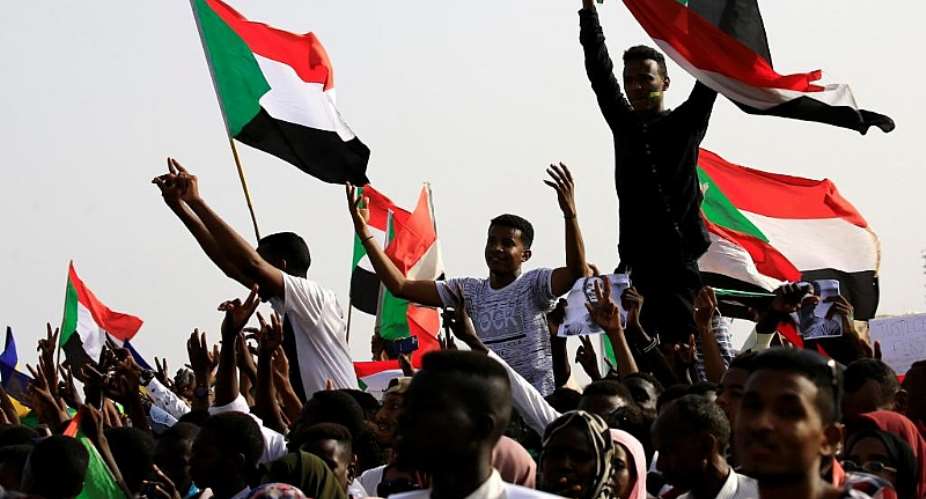Protest leaders in Sudan have called off talks with the military, saying they need more time to consult internally. There has been no new date set for negotiations to resume.
On Wednesday, the two sides inked a power-sharing deal to form a joint civilian-military body tasked with installing a civilian administration.
Not everyone in the protest movement is on board. "We need more internal consultation to reach a united vision," prominent protest leader Omar al-Digeir told AFP Friday.
The delay came two days after Sudan's army rulers and protest leaders inked a power-sharing deal to form a joint civilian-military body tasked with installing a civilian administration.
However, protest leaders said that the three rebel groups that are part of the umbrella opposition movement expressed reservations over Wednesday's deal.
"I'm going to Addis Ababa to meet the Sudan Revolutionary Front to get their opinion," Digeir said.
It may not be good. Wednesday's deal has caused friction within the opposition.
"I don't know why they signed the deal. The rest of the parties were not there," says Zeinab Eldai, a former French diplomat in Paris, and now a member of the Sudan People's Liberation Movement.
"The rebel groups in Addis Ababa did not even know the document was going to be signed on that day. Nor did the Sudanese people," she told RFI.
Thorny issues
Friday's talks were meant to finalise a "constitutional declaration" to thrash out lingering issues.
Eldai says that talks can only move forward once everyone is on board.
The problem is not everyone is.
The Alliance for Freedom and Change that is leading the negotiations with the military rulers "are not united," says the ex-diplomat. "The military council is exploiting their divisions."
The other problem is the protesters. "Each time there is a failure in the negotiation process, they go onto the streets."
Hundreds of demonstrators marched in the capital Khartoum on Thursday to pay tribute to dozens of people killed in the months-long protest movement.
Police used tear gas to disperse the protesters gathered at a prominent square called the Green Yard, which has now been rebaptised Freedom square.
Too many concessions
The violence is likely to deepen rifts between the army and protesters, caused by a brutal raid on 3 June that left dozens dead and hundreds wounded.
Protesters and rights groups accuse Sudan's feared Rapid Support Forces paramilitary group of carrying out the crackdown. The group has dismissed the accusations as defamation.
Meanwhile, Sudan's military council has asked that soldiers implicated in other acts of violence be granted "absolute immunity" from prosecution.
The demand was expected to be one of the most heated issues at Friday's talks amid the impression by some in the Sudanese population that the protest movement has made too many concessions.
"They have given too much," comments Eldai. "It was almost a real revolution but these negotiators they gave the military council too much legitimacy and since then they have lost face," she said.





 Cecilia Dapaah: Reasons behind AG’s advice to EOCO not grounded in law – Martin ...
Cecilia Dapaah: Reasons behind AG’s advice to EOCO not grounded in law – Martin ...
 NPP should have reported Kingsley Nyarko’s conduct to police – Inusah Fuseini
NPP should have reported Kingsley Nyarko’s conduct to police – Inusah Fuseini
 Akufo-Addo cuts sod for MIIF Technical Training Centre
Akufo-Addo cuts sod for MIIF Technical Training Centre
 NPP didn’t struggle to win Ejisu by-election – Samuel Ayeh-Paye
NPP didn’t struggle to win Ejisu by-election – Samuel Ayeh-Paye
 A/R: Achiase Chief arrested for acid attack on community members
A/R: Achiase Chief arrested for acid attack on community members
 Naa Ayemoede returns to school
Naa Ayemoede returns to school
 Dadieso residents block Accra-Kumasi highway
Dadieso residents block Accra-Kumasi highway
 Kasoa soldier killer remanded
Kasoa soldier killer remanded
 Rashid Pelpuo slams Opoku Prempeh for denying dumsor
Rashid Pelpuo slams Opoku Prempeh for denying dumsor
